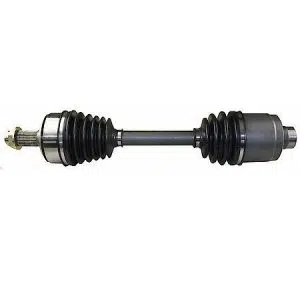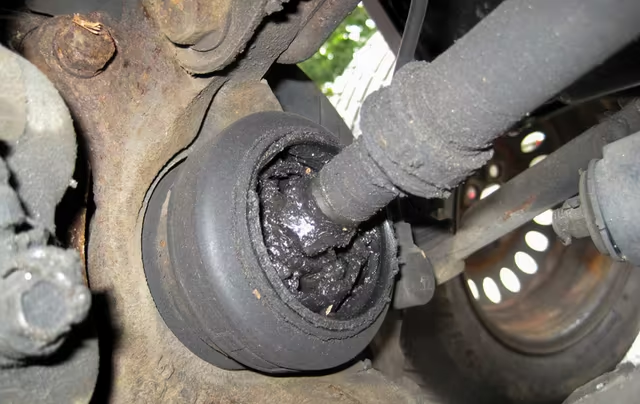A CV (Constant Velocity) joint is a mechanical device that allows rotational power to pass through angles in the driveline while maintaining constant speed. In front-wheel drive and many all-wheel drive systems, CV joints connect the transmission (or differential) to the wheel hubs via the axle shaft.
When a CV joint fails, the drivetrain loses its ability to transmit torque smoothly. Symptoms such as clicking noises in turns, vibration under acceleration, grease leakage, or wobble appear. Breakdown leads to loss of drive, wheel damage, or even suspension harm.
Hence, knowing CV joint replacement cost, what drives it, and whether to DIY is critical for car owners.

What Does Replacement Entail?
CV Joint vs CV Axle Replacement
Often, shops don’t just replace the joint alone. They replace the entire CV axle assembly (shaft + inner & outer joints). That is because it saves labor and the risk that the remaining joints fail soon. Many cost guides quote CV joint replacement but actually refer to axle replacement. (AutoZone)
Steps In Replacement
-
Lift and support the vehicle safely
-
Remove the wheel and loosen the axle nut
-
Disconnect lower suspension components (ball joint, control arm)
-
Pull the CV axle from the hub
-
Remove from transmission or differential
-
Install new axle/joint, align splines
-
Reassemble suspension, torque to spec
-
Refill any lost fluid, test drive
Each make/model has its own coupling details, snap rings, and re-installation procedures.
Typical Cost Range
National & Industry Estimates
| Source | Quoted Range | Parts Estimate | Labor Estimate |
|---|---|---|---|
| RepairPal | $1,174 – $1,291 | $923 – $924 | $251 – $368 |
| J.D. Power | $300 – $1,500 | $760 – $1,030 | $170 – $180 |
| AutoNation Mobile | $1,000 – $1,080 | $830 – $850 | $170 – $230 |
| AutoNation (Axle basis) | $930 – $1,400 | $760 – $1,050 | $170 – $350 |
| CarTalk | $900 – $1,200 | — | — |
| RepairPal (Ford F-150 example) | $815 – $948 | $530 (parts) | $285 – $418 |
From these, a typical professional shop cost for many passenger cars in the U.S. falls into $900–$1,400 per side. Cases at $300–$400 also appear (e.g. Reddit reports) but often for simpler vehicles or in lower-cost regions.
A very high outlier: a 2006 Honda Accord CV joint parts cost $1,539 and labor of $208–$305 used in cost estimation.
Hence the realistic “sweet spot” estimate is $1,000–$1,300 for many standard vehicles, excluding taxes and extras.
What Drives the Cost?
The total bill depends on multiple factors. Each factor interacts.
1. Vehicle Make, Model & Drivetrain Design
-
Luxury brands or AWD/4WD systems use stronger, more complex joints
-
Heavy trucks or SUVs require sturdier axles, adding parts cost
-
Some models have difficult packaging requiring extra disassembly
2. Part Quality: OEM, Aftermarket, Remanufactured
-
OEM parts cost more than aftermarket
-
Aftermarket may have lower durability
-
Remanufactured units can be cheaper, but risk unknown life
3. Labor Rate & Hours
-
Urban dealerships from $120–$200+ per hour
-
Independent shops lower
-
Complexity (rust, access, interfering parts) extends hours
4. Associated Repairs
-
Boots, bearings, seals, sensors, hub components often replaced
-
If the boot is torn, contamination may demand full joint replacement
5. Regional Differences, Taxes & Shop Markups
-
Some shops add “shop supplies” or environmental fees
-
Taxes on parts and labor affect the final invoice
6. Number of Axles and Symmetry
-
Single side replacement vs dual sides
-
For AWD or 4WD, possibly 2 or 4 axles
Real Examples by Vehicle
-
Honda Accord: $1,747–$1,844 average (parts ~$1,539, labor $208–$305)
-
Ford F-150: $815–$948 (parts ~$530, labor $285–$418)
-
Volvo S60 (2001): Axle cost $463, labor 1.5–2 hrs in region with $130/hr labor
-
Dealer quote example: Honda Pilot single axle $703, both axles $1,365 quoted.
These examples illustrate how make, parts, and labor differ.
Symptoms That Trigger Replacement
Below is a list of common indicators that a CV joint or axle needs replacement:
Top 6 Warning Signs
-
Clicking or popping noise while turning
-
Grease splatter inside wheel well
-
Vibration during acceleration
-
Visible boot cracks or splits
-
Wobble or play in the axle when moved
-
Loss of power (drive failure)
Many cost guides and diagnostic sources list these as the main signs.
If any of these signs appear, delaying repair increases risk and cost.
DIY vs Professional Replacement
DIY Considerations
-
Requires mechanical skill and correct tools (torque wrench, axle puller)
-
Time investment is significant
-
Risk of damaging transmission seals or applying wrong torque
-
You save labor but may pay in repairs if done incorrectly
AutoZone classifies CV axle replacement as an “intermediate” DIY job.
When to Hire a Professional
-
If you lack prior undercar or drivetrain work experience
-
If the joint/axle is deeply buried
-
For warranty or peace of mind
Professionals ensure correct torque specs, alignment, and integration with suspension.
Cost Reduction Tactics
-
Source parts yourself and bring to the shop
-
Choose aftermarket or remanufactured models where safe
-
Replace just one side if the other side is healthy
-
Ask for labor rate breakdown and justification
-
Shop independent mechanics over dealerships
-
Bundle with other work (alignment, suspension) to negotiate
Note: Negotiation depends on shop policies.
Cost Breakdown per Component
| Component | Low Estimate | High Estimate | Notes |
|---|---|---|---|
| Basic aftermarket CV axle | $60 | $150 | Common retail range |
| OEM / premium part | $400 | $1,400+ | For luxury or complex systems |
| Labor per hour | $100 | $200+ | Depends on region, shop, complexity |
| Typical labor hours | 1.5 hr | 3 hr+ | More if rust or disassembly needed |
| Associated parts (boots, seals) | $20 | $200+ | If replaced concurrently |
| Taxes & fees | variable | variable | Shop adds these on top |
FAQs
Q1: Does joint type (Rzeppa, tripod, double offset) affect cost?
Yes. Different CV joint designs have varied internal geometry and complexity. A double-offset or inner CV joint tends to cost more due to its intricate balls and tracks.
Q2: Can a torn boot alone justify full joint replacement?
If the boot is torn but no contamination reached the internals yet, replacing the boot and relubricating may suffice. However, many shops prefer full joint replacement given the risk of hidden wear.
Q3: Is alignment always required after CV replacement?
Not always. If suspension geometry wasn’t disturbed, alignment may not be necessary. But when control arms or tie rods are disconnected, an alignment is recommended.
Q4: What is a “shop supply fee” and how much is typical?
A “shop supply fee” covers consumables (lubricant, rags, small parts). It is often $10–$50, sometimes a percentage of total invoice.
Q5: Does mileage affect warranty on replacement CV joints?
Yes—some parts come with mileage limits (e.g., 12,000, 36,000 miles). A shop labor warranty is often time-based (30, 90 days, or 12 months).
Q6: Can I install a CV joint from one model into another?
Only if the spline count, length, and boot shape match exactly. Using a mismatched joint causes vibration, wear, and failure.
Learn More: Assisted Pull-Up Machine: Complete, Search Focused Guide
What Is a Promise Ring: Complete Meaning, History, and Modern Significance
Conclusion
The CV joint replacement cost depends on multiple factors — vehicle type, part quality, labor rate, and the extent of damage. On average, drivers can expect to spend between $900 and $1,400 per axle at professional repair shops, while DIY repairs with aftermarket parts can cost significantly less.
Investing in a timely replacement not only restores smooth power delivery but also prevents further damage to the drivetrain, suspension, and tires. Delaying the repair can lead to more expensive failures and safety risks on the road.

